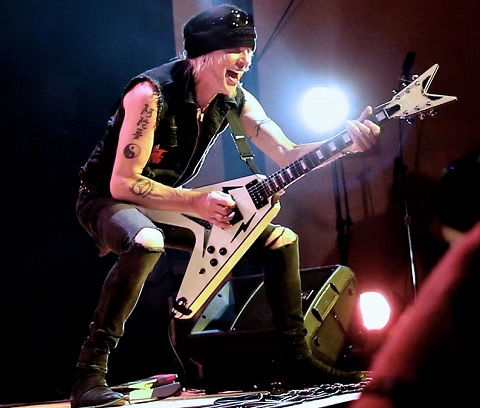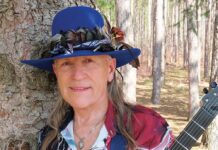Where does one begin in trying to define Michael Schenker’s place in rock and roll? The legendary guitarist practically invented a style of playing that not only influenced a whole host of famous players, but pretty much set the tone for hard rock guitar through the 80s and into the 90s.
From his first stabs in the Scorpions, to worldwide acclaim with UFO, to his own MSG (Michael Schenker Group) and Temple of Rock, Michael Schenker remains at the forefront of heavyweight riffmeisters. For 2017, the guitarist is promoting Fest: Live Tokyo International Forum A CD and DVD that features three singers he’s worked with over the course of 37 years — Gary Barden, Graham Bonnet and Robin McAuley. During the course of the following exchange, the guitarist told us all about it.
~
Watching the new DVD and listening to the CD, one is taken by how great it all is, but the first question that raced into my mind was how did something so wonderful like this even happen?
Originally a promoter got the idea and asked me if maybe we could get Graham Bonnet out to sing a few songs, with some of the guys from Temple Of Rock. I said, “Wait a minute, I’ve played with lots of great past singers, maybe it’s time to do this with lots of the original singers I have played with.” So we reached out to Gary Barden and Robin McAuley too, all incredible people and all having sung with me in the past.
It’s so special when something like this not only happens, but the musicians pull it off. You haven’t played with some of these guys for a while. Was there ever any worry that the show might not come off as well as it did?
In this case, the music connected everybody with one another and we couldn’t have worked together any better. Sure, there are always logistics to work out — getting visas together, flying people in — and that can affect things. The work itself was tough at times, surely. But in the end, this was a perfect way for me to unconsciously celebrate this third part of my life.
Care to explain what you mean by that?
Well, I look at my career in three parts really. In the beginning, at seventeen I had a vision and wanted to open doors for the Scorpions and then later for UFO to be famous enough to taste America, to get a taste of all that fame and what that was all like. And I am grateful I got to taste all of that. After a while though I needed to get out of that commercial money-gobbling machine, I had to get that out of my system, so in the middle years I was following what felt right to me. But I also felt like people were chasing me, to play with them, to be in their bands. I said no to Ozzy. I said no to Aerosmith, Deep Purple, Whitesnake. And people were saying to me all the time, “This guy is playing like you. This other guy is doing what you do.” And that’s OK, it’s kind of flattering. Of course, in the end, if you don’t have your own thing to contribute, you won’t really last long.
Now, in this last third I feel I can really develop, experiment, and that all started in the early 90s when for the first time I felt free. I built a recording studio, got into acoustic instruments, and in 2005, I went back to Germany. But during that time, right up until 2008 actually, I had terrible stage fright. I couldn’t really get up on a stage and play, if you can believe it.
Wow, that must have been debilitating for a player, especially someone like you who is so dynamic live.
Yes, it was hard to deal with, that’s for sure. But somewhere along the line I did a complete 360, I wanted to get up on stage again. So here I am.
I dare to ask this because I know your fans in America, like everywhere else, are salivating over the idea: Is there any chance we might see a Michael Schenker Fest tour?
Yes. Step by step we have been getting offers to do this again. UK, Spain, where the venues are bigger — yes promoters have been trying to make it work beyond just the one show. There have been promoters in America suggesting we come over next year around February do to some dates there as well. We will try to fit it all in between the usual round of dates we are doing this summer in Europe and beyond.
On the CD and DVD, that Tokyo audience is like a wild rockin’ American one. Playing globally as you do, do you find audiences are different from country to country?
People of the 70s, 40 years ago or more now, were not prepared for lead guitar to go where I took it. But the wide core masses slowly came to understand what I was trying to do, I mean, every second house hold has a guitar in it, but it was my assignment as I saw it in the 70s and 80s to reach a wider, a more commercial audience. Now after 40 years people are educated, younger people have the right idea. So I see equally crazy audiences in Spain as I do in Japan as I do in America.
Do you feel time on your back? I’m thinking about how many great musicians we lost last year alone and you mentioning the death of Elliot Rubinson of Dean Guitars on your website.
I live in the now, but yes time is always moving forward. Before you know it you don’t have the memory to go out there. I just want to keep enjoying it, having fun and keep going as long as I can.
And for you, the playing, recording, all of it, is still intuitive, just as much feel as technique?
Yes. After 43 years in music I know when someone, something is happening or not. I’m not a technical guy, I have always let my heart be the focus, let the lead guitar be my self-expression. To explore those colors that nobody would have ever seen unless I did this, go to that inner infinite place where I am constantly looking for freshness. I’m not into trends, I’m a trend maker. And I want to always be coming up with that fresh stuff.




















